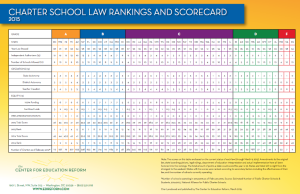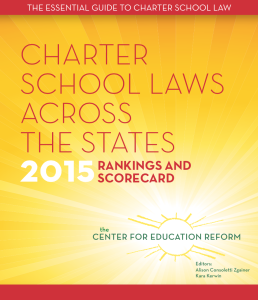States Show Little Progress On Annual Education Scorecard
Nineteen Years Of Charter School Policy Analysis Reveal Lawmakers Must Strengthen State Laws
CER Press Release
Washington, DC
March 16, 2015
Of the 42 states and the District of Columbia that have charter school laws, only one-third earned above-average scores for implementing a strong policy environment according to the 16th Edition of Charter School Laws Across the States 2015: Rankings and Scorecard released today by The Center for Education Reform (CER).
“It is abundantly clear that little to no progress has been made over the past year. Charter school growth does continue at a steady, nearly linear pace nationally, especially in states with charter laws graded ‘A’ or ‘B,’ but an even more accelerated pace would allow charter schools to play a more central role in addressing the demands and needs of our nation’s students,” said Kara Kerwin, president of CER.
“Strong charter laws feature independent, multiple authorizers, few limits on expansion, equitable funding, and high levels of school autonomy,” said Alison Consoletti Zgainer, CER Executive Vice President and the report’s lead editor. “Many states that appear to have all of the critical components of a strong law struggle with the implementation of key provisions, which is why the rankings over the past few years have shown little variance and have remained relatively stagnant.”
Only four states and D.C. earned As, with D.C. holding on to the number one seat for seven years in a row. Eight states earned Bs, 19 Cs, and 11 earned Ds or Fs. Thirteen states saw changes to their ranking since last year, but any changes to laws within the past year have been modest at best as this ranking and scorecard demonstrates.
“The lack of progress made in statehouses across the country over the past few years to improve the policy environment for charter schools can be chalked up to a lack of political will leading up to a major mid-term election” said Kerwin. “However, the biggest culprit is a lack of information, and a growing body of misinformation, as to what constitutes strong, responsible charter school policy.”
Since 1996, CER has studied and evaluated charter school laws based on their construction and implementation, and whether or not they yield the intended result of the charter school policy, which is to ensure the creation of numerous quality learning opportunities for children.
Click here for the 16th edition of Charter School Laws Across the States: Rankings & Scorecard














